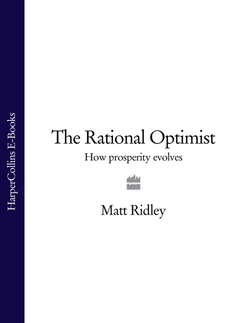Читать книгу The Rational Optimist: How Prosperity Evolves - Matt Ridley, Matt Ridley - Страница 12
Happiness
ОглавлениеAs necessities and luxuries get cheaper, do people get happier? A small cottage industry grew up at the turn of the twenty-first century devoted to the subject of the economics of happiness. It started with the paradox that richer people are not necessarily happier people. Beyond a certain level of per capita income ($15,000 a year, according to Richard Layard), money did not seem to buy subjective well-being. As books and papers cascaded out of the academy, Schadenfreude set in on a grand scale among commentators happy to see the unhappiness of the rich confirmed. Politicians latched on and governments from Thailand to Britain began to think about how to maximise gross national happiness instead of gross national product. British government departments now have ‘well-being divisions’ as a result. King Jigme Singye Wangchuck of Bhutan is credited with having been the first to get there in 1972 when he declared economic growth a secondary goal to national well-being. If economic growth does not produce happiness, said the new wisdom, then there was no point in striving for prosperity and the world economy should be brought to a soft landing at a reasonable level of income. Or, as one economist put it: ‘The hippies were right all along’.
If true, this rather punctures the rational optimist’s balloon. What is the point of celebrating the continuing defeat of death, dearth, disease and drudgery, if it does not make people happier? But it is not true. The debate began with a study by Richard Easterlin in 1974, which found that although within a country rich people were generally happier than poor people, richer countries did not have happier citizens than poor countries. Since then the ‘Easterlin paradox’ has become the central dogma of the debate. Trouble is, it is wrong. Two papers were published in 2008 analysing all the data, and the unambiguous conclusion of both is that the Easterlin paradox does not exist. Rich people are happier than poor people; rich countries have happier people than poor countries; and people get happier as they get richer. The earlier study simply had samples too small to find significant differences. In all three categories of comparison – within countries, between countries and between times – extra income does indeed buy general well-being. That is to say, on average, across the board, on the whole, other things being equal, more money does make you happier. In the words of one of the studies, ‘All told, our time-series comparisons, as well as evidence from repeated international cross-sections, appear to point to an important relationship between economic growth and growth in subjective well-being’.
There are some exceptions. Americans currently show no trend towards increasing happiness. Is this because the rich had got richer but ordinary Americans had not prospered much in recent years? Or because America continually draws in poor (unhappy) immigrants, which keeps the happiness quotient low? Who knows? It was not because the Americans are too rich to get any happier: Japanese and Europeans grew steadily happier as they grew richer despite being often just as rich as Americans. Moreover, surprisingly, American women have become less happy in recent decades despite getting richer.
Of course, it is possible to be rich and unhappy, as many a celebrity gloriously reminds us. Of course, it is possible to get rich and find that you are unhappy not to be richer still, if only because the neighbour – or the people on television – are richer than you are. Economists call this the ‘hedonic treadmill’; the rest of us call it ‘keeping up with the Joneses’. And it is probably true that the rich do lots of unnecessary damage to the planet as they go on striving to get richer long after the point where it is having much effect on their happiness – they are after all endowed with instincts for ‘rivalrous competition’ descended from hunter-gatherers whose relative, not absolute, status determined their sexual rewards. For this reason a tax on consumption to encourage saving for investment instead is not necessarily a bad idea. However, this does not mean that anybody would be necessarily happier if poorer – to be well off and unhappy is surely better than to be poor and unhappy. Of course, some people will be unhappy however rich they are, while others manage to bounce back cheerful even in poverty: psychologists find people to have fairly constant levels of happiness to which they return after elation or disaster. Besides, a million years of natural selection shaped human nature to be ambitious to rear successful children, not to settle for contentment: people are programmed to desire, not to appreciate.
Getting richer is not the only or even the best way of getting happier. Social and political liberation is far more effective, says the political scientist Ronald Ingleheart: the big gains in happiness come from living in a society that frees you to make choices about your lifestyle – about where to live, who to marry, how to express your sexuality and so on. It is the increase in free choice since 1981 that has been responsible for the increase in happiness recorded since then in forty-five out of fifty-two countries. Ruut Veenhoven finds that ‘the more individualized the nation, the more citizens enjoy their life.’
